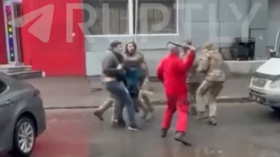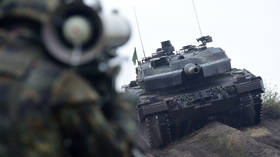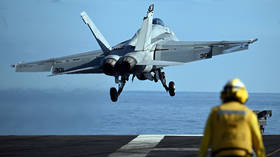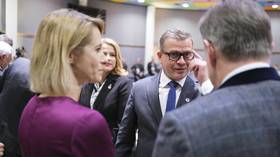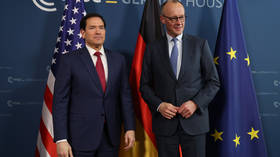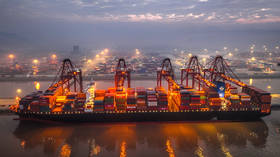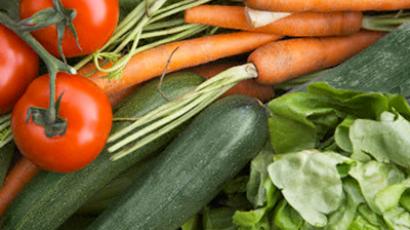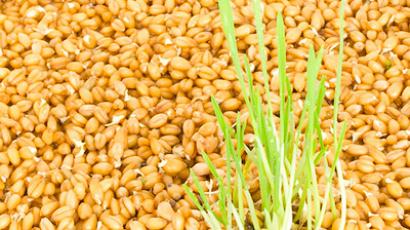Vegetables on the plate at Russia-EU Summit
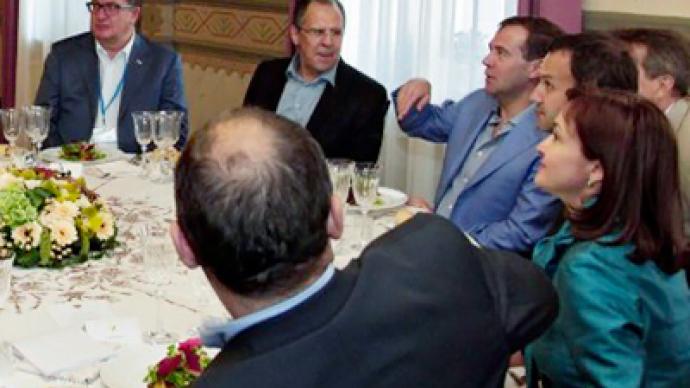
Delegates wrapped up the 27th Russia-EU Summit at the ancient Russian city of Nizhny Novgorod where President Dmitry Medvedev said Moscow was preparing to lift a ban on fresh vegetables from the EU following a deadly E. Coli outbreak.
The Q&A part of the press conference got off to a rather non-traditional start when a reporter from Rossiya TV asked the three leaders – President Medvedev, European Union President Herman Van Rompuy and European Commission President Jose Manuel Barroso – if they ate the vegetables served at the Summit.“Yesterday, you had an informal dinner, and today a working lunch,” the reporter stated. “Did you eat any vegetables, what vegetables did you eat, and were you worried about eating them?”The second part of the journalist's inquiry was directed to the EU Commissioner: “Mr. Barrosso, had Russia not banned vegetables from the EU, would you have eaten them?”President Dmitry Medvedev, obviously quite amused by the question, confirmed that the leaders did, in fact, eat their vegetables, although the exact source of the produce was not immediately identified.“Just now, we had tomatoes, different tomatoes,” Medvedev confirmed. “But I am not sure of the origin.”Medvedev went on to say that Russia will be ready to lift its ban on fresh vegetable imports from EU member states only after the EU guarantees the safety of its products. This will require the implementation of a food-safety certificate drafted by Russia and EU specialists, he said."We discussed a mechanism of restarting deliveries of European vegetables to the Russian market,” he said. “We are ready to resume such deliveries if the EU's services in charge of these issues offer guarantees. This is absolutely certain.”Barroso, who did not confirm if he had eaten vegetables during the summit, did acknowledge that EU officials plan to send the food-safety certifications “today or tomorrow” to their Russian partners. How long it will take for Russia to drop the vegetable ban at that point was not established.The outbreak of E. Coli in Germany has been a major embarrassment for the European Union, which prides itself on tough safety standards and public awareness. Germany was the source of the outbreak, which has led to the death of 29 people, with about 3,000 people sickened. According to the latest reports from Germany’s national disease control center, over 700 people are still suffering complications from the E. Coli outbreak that may cause kidney failure and death. The World Health Organisation says 97 others have fallen sick in 12 other European countries, as well as three in the United States.German officials have been severely criticized for their failure to identify the source of the contamination, but on Friday there appears to have been a breakthrough."We narrowed down epidemiologically the cause of the outbreak of the illness to the consumption of sprouts," Reinhard Burger, the head of Germany's national disease control center told a news conference in Berlin on Friday.According to health officials, the victims were sickened while eating at one of 26 restaurants and cafeterias that had received the contaminated produce.Meanwhile, Germany’s Federal Institute for Risk Assessment President, Andreas Hensel, said authorities were lifting the warning against consuming cucumbers, lettuce and tomatoes, stressing that the threat of E. Coli in those vegetables no longer exists.Burger, however, warned that the crisis is not yet over and consumers should avoid sprouts.On June 2, Russia’s consumer rights watchdog, Rospotrebnadzor, imposed an immediate ban on all vegetables coming from the European Union. Russia’s move to ban vegetables from the EU following news of the E. Coli outbreak sparked accusations from EU officials that Russia was acting “disproportionately.” Prime Minister Vladimir Putin responded that Russia would never “poison its people for the sake of some spirit.”Russia quickly arranged for new imports of cucumbers from Ukraine, Azerbaijan, Egypt and Turkey.Russia's chief sanitary doctor Gennady Onishchenko, meanwhile, who heads the consumer agency, said Russia will lift its ban on imports of vegetables from Europe after receiving guarantees of the European Commission."We will resume supplies after getting necessary guarantees, including lab tests," Onishchenko stressed. "The accompanying note must say that the products were tested for that agent, the result is negative, and that it is this very batch and not some other. This is a quite accessible and not burdensome measure." Meanwhile, the “cucumber scandal” has sparked a heated row among EU member states as well. German officials jumped the gun when the crisis first began, pointing to cucumbers imported from Spain as the culprit. Those accusations, which have cost Spanish farmers hundreds of millions of dollars in revenue since the outbreak began, turned out to be false.Spain's agricultural sector is responsible for 15 per cent of the nation's GDP and generates more than 300,000 jobs. Meanwhile, the country produces about 16 million tons of fruit and vegetables annually, with about 50 per cent of the production being exported throughout Europe. The E. Coli outbreak, which hit German and Spanish farmers particularly hard, will be felt for years, analysts predict. Before the crisis broke out, Spain was already suffering from the highest unemployment rate in the European Union.Both German and Spanish officials said they will petition Brussels to provide emergency aid to the farmers affected by the deadly E. Coli outbreak.The next Russia-EU summit will be held in Brussels at the end of 2011, said European Union President Herman Van Rompuy.Van Rompuy said at a press conference after a Russia-EU summit that he would be looking forward to the Russian president's visit to Brussels at the end of the year for the next Russia-EU summit.The EU president, however, provided no indication as to what vegetables will be served at the next meeting.Robert Bridge, RT



